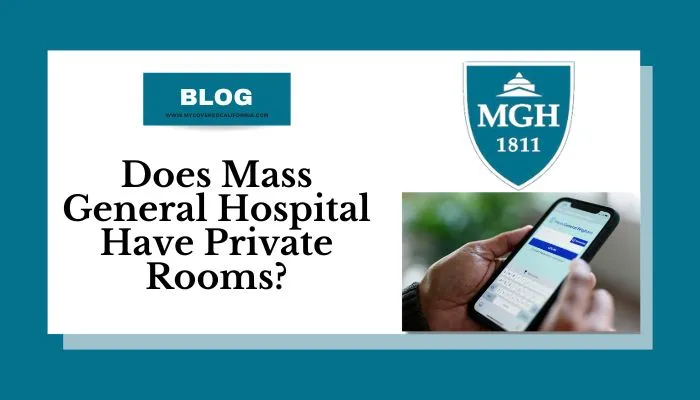Does Mass General Hospital Have Private Rooms? The Massachusetts General Hospital(MGH) of Mass General Brigham is known all over the world and has consistently maintained top positions in patient care and ground-breaking medical advancements.
But there is a central element beyond advanced technology and highly trained personnel that promotes healing: the patient’s surroundings.
This article will look at why private rooms matter in hospitals, as it discusses their effect on patients’ comfort, infection control, overall experience, and ultimately recovery.

Does Mass General Hospital Have Private Rooms?
Consider after surgery or during an illness. The vulnerability you feel is immense. A private room becomes a sanctuary, a space where you can rest and heal with dignity. Here are some of the ways that private rooms enhance patients’ comfort and privacy:
Uninterrupted Sleep: Multi-patient rooms may be noisy due to patients having different schedules or levels of mobility among them. A private room allows uninterrupted sleep which is important for recovery.
Pain Management And Personal Care: Some medical procedures or conditions require high-level privacy. Private rooms can help facilitate better pain management as well as personal care routines for patients.
Open Communication with Doctors: More challenging conversations between doctors and patients often happen more easily when they take place in quiet, secluded spaces such as private rooms.
Being sick comes with so many stresses. A private room gives an individual a sense of control as well as creates space to focus on both physical and emotional healing.
The Fight Against Hospital-Acquired Infections
Germs fill hospital wards nowadays/Today’s hospitals teem with germs. Though strict hygiene measures are in place, close quarters shared among some hospital residents can heighten the risk of hospital-acquired infections (**HAIs**). There are several advantages to using private rooms instead:
- Reduced Transmission: Private rooms significantly slow down the spread of infections particularly those transmitted through air or via contact with contaminated surfaces by minimizing contact between other patients.
- Isolation Protocols: Patients with contagious diseases need to be kept in private rooms so that the infection does not spread among other patients and healthcare providers.
Most hospitalized patients have compromised immune systems, rendering them more prone to infections. Private rooms ensure that their exposure to potential pathogens is limited.
Enhancing The Patient Experience
Modern healthcare goes beyond simply treating the illness. Taking a holistic approach that considers a patient’s entire experience is critical. This objective can be substantially achieved through private rooms:
Caregivers in private rooms can give individual attention as there are few interruptions. Private rooms provide more comfortable and inviting spaces for family visits and support, which are integral aspects of wellness in patients.
An individual may greatly reduce stress and anxiety by being in an environment that is quiet and controlled such as a private room thus enhancing a positive healing experience.
The Impact of Private Rooms
Several studies suggest a link between the use of private rooms and improved patient outcomes. These advantages translate into an easier recovery process:
| Reduced stress, better sleep, and minimized risk of infection can all contribute to a faster recovery process. A comfortable, private, and personalized experience fosters a sense of control and well-being leading to higher patient satisfaction. |
It is important for optimal care that patients and care providers communicate openly. Open conversations with healthcare providers in a private room ensure open talks based on trust and discussion of medical options.
The Worth of Private Rooms
While the extra cost of private rooms might be offset by their comfort and privacy, they also offer more. Patients can get better healthcare experiences because it prevents infections, increases patient experience, and leads to quick healing.
Hospitals, that prioritize private rooms do not only handle hospital emergencies, but they also consider the long-term wellness of their patients.
- MGH: Committed to Patient-Centered Care
- MGH understands that patient healing is supported by private rooms. The hospital works towards having various accommodations like individual room preferences.
The Hospital Room Spectrum
Usually, hospitals have different kinds of rooms to effectively cater to all types of patients who come into their premises. Let us explore some of these common ones:
These large and open spaces usually have multiple beds, often four or six; thus a limited amount of privacy since it’s used for minor cases or short stays only. They are like general wardrooms but they house two persons separated by curtains or dividers giving rise to a compromise between privacy and cost.
Earlier discussed above private room is an option where one person occupies the space thereby offering utmost confidentiality as well as enhanced comfort.
Key Differences Between Room Types
Several beds may be an obvious differentiator between these room types, but other things set them apart:
| Aspect | General Ward Rooms | Semi-Private Rooms | Private Rooms |
|---|---|---|---|
| Privacy | Almost no isolation | Moderate isolation | Maximum solitude |
| Noise Level | High noise levels due to multiple occupants and staff | Improved compared to general ward rooms | Quietest among all options |
| Amenities | Limited or no additional amenities | Limited amenities | Additional amenities such as sleeper chairs, television, individual bathroom |
| Cost | Lower cost due to shared accommodation | Moderate cost | Higher cost due to exclusive facilities |
Factors Influencing Private Room Availability
The presence of any private rooms within the hospital facility can be affected by various factors such as:
During peak times, hospitals may also not have enough private beds to accommodate many patients who come in during those times. A patient’s condition may necessitate a single room if this health situation requires isolation protocols or close observation by medics.
Depending on their terms of service and the nature of medical cover some insurers accept paying for single-bed facilities while others do not pay for the same.
MGH: Unveiling Private Room Options
Familiarizing yourself with MGH’s policy concerning these specific individual spaces will empower you with enough knowledge to make your healthcare journey better informed.
- Throughout its history, MGH has consistently offered patients a variety of different room choices, including private ones, because it realized how important they were to improving patients’ well-being.
- Patient preferences for private rooms should be accommodated whenever possible at MGH. To encourage questions about this information availability and additional costs should be made among healthcare professionals.
- Similar to other medical centers, in determining the allocation of private wards, MGH often considers issues like medical necessity criteria, insurance practices as well as overall capacity.
Although details about the percentage of private rooms in MGH are not publicly available, the hospital’s commitment to patient-centered care implies that it prioritizes giving private rooms whenever possible.
Planning For Your Stay
Knowing your choice of hospital rooms and MGH’s policy on private rooms will result in involvement in decision-making concerning your preferences as to where you will be accommodated. Here are some tips for a proactive approach:
Discuss Room Options with Your Doctor: Share your desire for a private room during pre-admission consultations with your doctor who may advise you on its feasibility according to your medical condition and insurance coverage.
Understanding Insurance Coverage: Familiarize yourself with the aspects regarding private room coverage by your insurance plan. This information will enable you to make decisions based on what costs are involved.
Communicate Early: The earlier you tell that you would prefer a private hospital room, the higher the chances that MGH has to fulfill this request based on availability.
You can have greater knowledge and confidence about being admitted into a hospital if only you understand the terrain of hospital room choices and MGH’s devotion to looking after patients so that they get better.
Finding the Right Fit and Making an Informed Decision
Lastly, deciding whether or not to pursue a private room at MGH is ultimately up to each individual. Here are some steps to guide you:
| Advice | Description |
|---|---|
| Consult with Your Physician | Discuss the importance of having personal space during medical visits, considering insurance coverage and medical conditions. |
| Prioritize | Consider the benefits of privacy, reduced infection risk, and increased comfort against the cost and availability of different accommodation options. |
| Give Early Notice | Notify MGH promptly about your preference for personal space to increase the likelihood of arrangements being made, taking availability into account. |
Weighing up the advantages and disadvantages of private rooms alongside patients’ experiences at MGH will enable you to make the right decision that fits into your budgetary needs.
Conclusion
We have discussed the importance of private rooms in hospitals as they contribute towards enhancing privacy, comfortability, and the recovery process. So, Does Mass General Hospital Have Private Rooms?
When we talk about how MGH does things differently from elsewhere; we must also appreciate what it has achieved (less likelihood of infection leading to better satisfaction) as well as prospects for improvement (cost implications; many are full).
The positive impact of such facilities on patients’ lives was shown through their eyes. Think about your situation, talk over alternatives with your doctor, and notify MGH early enough.
However, there is a need for moderation even though private rooms offer apparent benefits. You can therefore trust MGH because it considers its patients first before any other thing throughout their stay here.

Hello, I’m Curtis Wallace, your go-to support for MGH Patient Gateway. With a commitment to streamlined healthcare processes, I’m here to guide you through your patient portal journey.